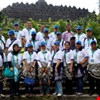NEWS SEARCH

Indonesian Lecturers Learn about IWRM ToolBox
26 lecturers from Indonesian universities recently met in Yogyakarta, Indonesia, together with GWP representatives for a workshop on Integrated Water Resources Management (IWRM) ToolBox.
Our Involvement in NARBO Training
One of our partners, The Network of Asian River Basin Organizations (NARBO), held its 8th IWRM Training in Thulhiriya, SriLanka from 27 November-4 December 2013 to be hosted by Mahaweli Authority of Sri Lanka (MASL). The Training theme is "Enhanced Water Security through IWRM - Mahaweli Experience".
The eight days training program used a mix of participatory and trans-disciplinary case studies which aims to develop the capacity of participants in IWRM Implementation by using the "IWRM Spiral Model" which was introduced as part of the "IWRM Guidelines at River Basin Level" and issued by UNESCO in 2009. 27 Participants from 11 countries includes: Lao PDR, Thailand, Malaysia, Indonesia, Philippines, India, Nepal, Bangladesh, Pakistan, Afghanistan and Sri Lanka.
Country Toolbox Website Consolidation
On 18 December 2013, Indonesia Water Partnership re-introduced Tool Box to 14 participants who came from Government, Professional, University, and NGO. Resource Persons came from: Government (DG Water Resources, Ministriof Public Work); Private Companies, NGOs, Highe Education (University). Indonesia Water Partnership (INA-WP) as an organizer and Co-organizer was Directorate of Water Resources, Ministry of Public Work, Republic of Indonesia. Inkind support received are meeting room, sound system and LCD
“We are trying to bring more people to write and share their result of hard work in to article and share it with other people by using Tool Box” Dr. Melati Ferianita , Indonesia Water Partnership.
Indonesia Water Partnership: Dialogue on Local Community Capacity Building on Drought
As an anticipation of drought problems, Indonesia Water Partnership held a dialogue with Local community on drought in a Meeting Room of Ministry of Public Work in Jakarta, Indonesia on 11 December 2013.
Indonesia is a country with two season, dry season and rainy season. During the dry season, drought has been a problem for society, industry and agriculture. There is not enough water to drink, cleaning, and washing for society. For farmers, it can be crop failure, late harvesting which make farmers lost their fund and start cropping from beginning. And for industry, there is also not enough water to run the business.